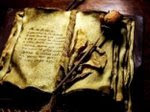 SONG Just Walkin' in the Rain
SONG Just Walkin' in the RainWRITTEN BY Johnny Bragg and Robert Riley
PERFORMED BY The Prisonaires
APPEARS ON Sun Records single (1953, #2 U. S.); Just Walkin' in the Rain (1991 and 1994); many general doo wop and 50s R&B anthologies.
NOTE Thanks to Peter Tibbles, who writes a Sunday music column on the blog Time Goes By, for calling my attention to this song in his 2/21/10 entry about Sun Records.
Of all the popular songs with underlying stories of sadness and loss, perhaps none is as steeped in personal tragedy and vanished promise as the Prisonaires "Just Walkin' in the Rain." As the story goes, convicted multiple rapist Johnny Bragg walked across the Tennessee State Prison yard one afternoon with fellow inmate Robert Riley when it began to rain. "Here we are," Bragg is supposed to have said, "Just walking in the rain and wondering what the girls are doing." Riley suggested that Bragg's apothegm had the potential for a song; as Bragg was illiterate, he dictated the words to Riley, who wrote them down in exchange for a songwriting credit.
Bragg joined forces with four other prisoners convicted of murder, involuntary manslaughter, and larceny. I don't know whether these men were guilty or not. The record says that they were, but the chances of a black male receiving due process in the Jim Crow South of the 1950s were slim. In any case, radio host Joe Calloway heard the Prisonaires singing while preparing a broadcast from the Tennessee State Prison.
Calloway persuaded the prison's relatively progressive warden to let the quartet perform on the air. These performances came to the attention of legendary Sun Records producer Sam Phillips, who arranged the recording session, under heavy armed guard, that produced "Just Walkin' in the Rain." The single sold 50,000 copies, a not insignificant amount in 1953.
It would be the group's only hit. The unusual use of an acoustic guitar behind the doo wop vocals creates a haunting effect as lonely and forlorn as a Hank Williams song. (Indeed, I would like to have heard Hank sing this one.) Although the song may be about girls, the perhaps unintentional imagery of incarceration is striking and remarkable. The rain itself seems like prison bars, a heart is tortured, people stare at the singer through a window that separates him from the outside world as if he were a freak. Indeed, they wonder "who can that fool be." By the end of the song, rain and torture have become inextricably linked.
The Prisonaires were a favorite of Tennessee's powerful governor Frank Clements, a relative moderate by southern standards. Clements often had the band perform at the governor's mansion, and was likely responsible for the commutation of Bragg's sentence in 1959. Once out of prison, Bragg continued an undistinguished recording career. He died of cancer in 2004.
LYRICS
Just walkin' in the rain
Getting soaking wet
Torturing my heart
By trying to forget
Just walkin' in the rain
So alone and blue
And all because my heart
Still remembers you
People come to windows
They always stare at me
Shaking their heads in sorrow
Saying, who can that fool be?
Just walkin' in the rain
Thinkin' how we met
Knowing things could change
Somehow I can't forget
(Just walkin' in the rain)
(Walkin' in the rain)
(Walkin' in the rain)
(Just walkin' in the rain)
(All day I...)
People come to their windows
They always stare at me
Shaking their heads in sorrow
Saying, who can that fool be?
Just walkin' in the rain
(Walkin' in the rain)
Getting soaking wet
(Walkin' in the rain)
Torturing my heart
(Walkin' in the rain)
By trying to forget
(Walkin' in the rain)
It was typical in the 50s and early 60s for white singers to sing homogenized versions of songs originated by black performers. Pat Boone was particularly famous (or infamous, depending on your perspective) for this. Here, white singer Johnnie Ray performs "Walkin' in the Rain," a version that I think is fair to say does not hold a candle to the original in terms of emotional impact. Supposedly, that's Ray Coniff whistling.

Jeez, Johnnie Ray actually makes the song sound perky! Bleah!
ReplyDeleteInteresting tale about the song's composition, and about The Prisonaires. And you're right, their version is much better.
Enjoyed the song and the story about this unique group, The Prisonaires. Merci beaucoup for stopping by and for your kind comment and wishes! Have fun, cher!
ReplyDeleteRe Johnny Ray, it's not like he didn't try in places. But he just didn't get it. As Tony Soprano put it in a different context, guys today have no room for the penal experience.
ReplyDeleteThanks, Marguerite! I hope your friend has been getting encouraging news.
What an awesome family discovery!!
ReplyDeleteI just found out that William Stewart (guitar player and bass singer with the Prisoniares) is my second cousin. His mother and my grandfather (my mother's father) are siblings.
They were very talented,and loved singing for others....
Kathy
How cool! To my ears, the guitar is a vital part of the success of the song. Los Zafiros, a Cuban group, is one of the rare doo wop groups for the guitar was an important part of their sound.
ReplyDeleteMr Ray did a magnificent job on this, his version of the song. A great talent.
ReplyDeleteListened to The Prisonaires original version following a recommendation from Tom Waits (dude knows what he's taking about). So many good songs suffer in production but this one fortunately was left under its own weight to tell its story of heartache and despair. Johnny Ray's misunderstood attempt sounded like he was skipping down to the annual carnival - should never have been released.
ReplyDelete